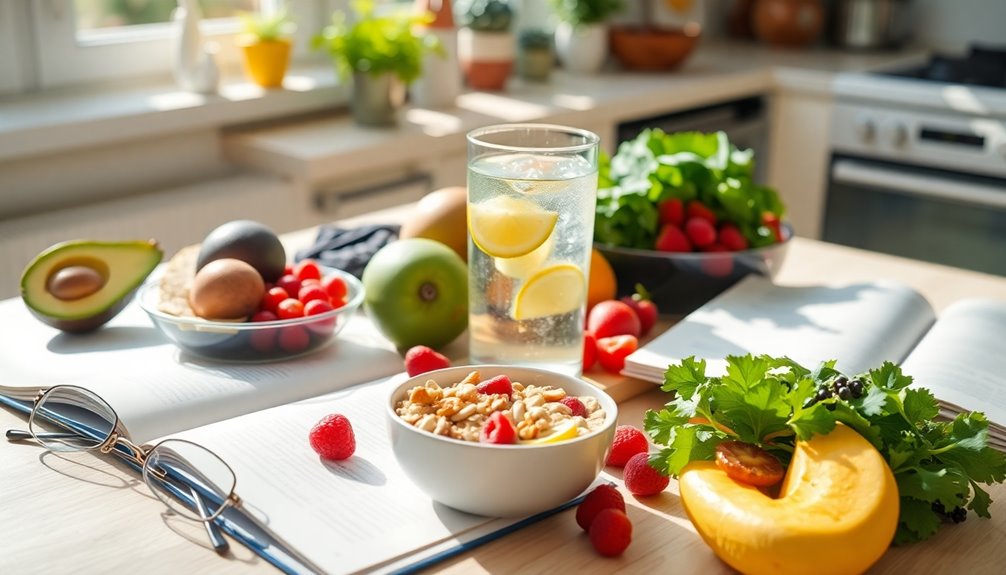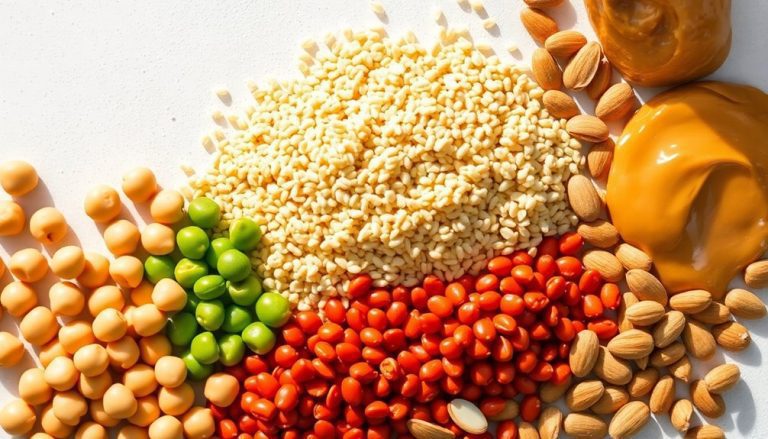To boost your health as a senior, focus on nutrient-dense foods like colorful fruits, leafy greens, and lean proteins. Stay hydrated by aiming for at least eight glasses of water daily, and don't forget fiber-rich options such as whole grains and legumes to support digestion. Keep an eye on portion sizes by using smaller plates and practicing mindful eating. Limit processed foods and sugars, and incorporate healthy fats like avocados and nuts for brain health. Planning balanced meals ensures you're getting all the essential nutrients. Discover how these tips can positively impact your daily life and well-being.
Key Takeaways
- Prioritize nutrient-dense foods like colorful fruits, vegetables, whole grains, lean proteins, and healthy fats for sustained energy and immune support.
- Stay hydrated by drinking plenty of water and incorporating hydrating foods like watermelon and cucumber into your diet.
- Increase fiber intake with whole grains, fruits, vegetables, legumes, and nuts to promote digestive health and prevent constipation.
- Practice portion control by using smaller plates, measuring servings, and eating slowly to recognize hunger and satisfaction cues.
- Limit processed foods, sugars, and unhealthy fats while striving for a balanced diet that includes all food groups for optimal health.
Prioritize Nutrient-Dense Foods
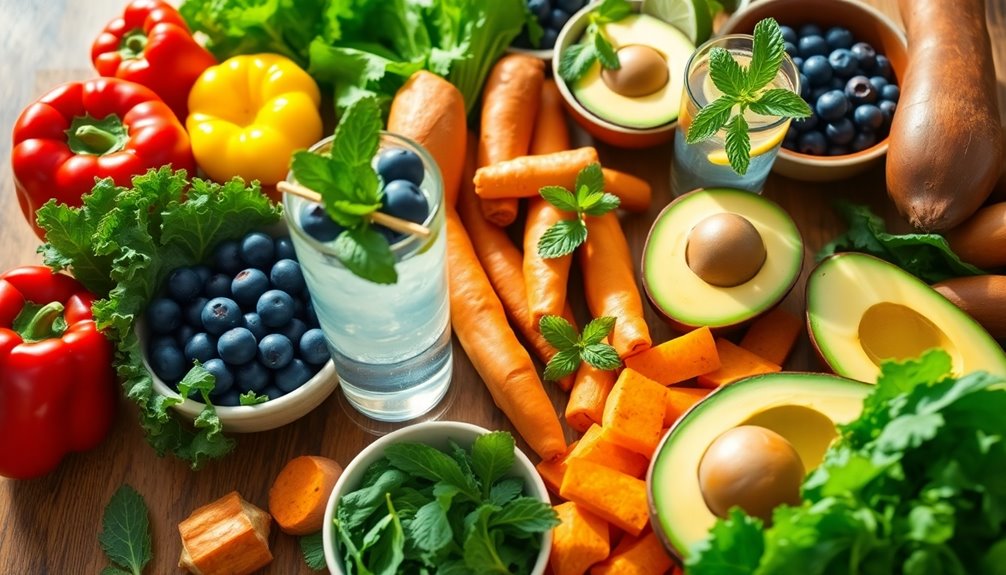
When it comes to your health, prioritizing nutrient-dense foods is essential for seniors. These foods pack a powerful punch, offering vitamins, minerals, and other nutrients without excessive calories. By focusing on such foods, you can help maintain your energy levels, support your immune system, and reduce the risk of chronic diseases. Additionally, using quality soil products can enhance the nutrient content of the fruits and vegetables you grow.
Incorporate a variety of colorful fruits and vegetables into your meals. Leafy greens like spinach and kale are rich in antioxidants, while berries provide fiber and essential vitamins.
Don't forget whole grains like quinoa and brown rice, which are excellent for digestion and sustained energy.
Protein is another critical component. Opt for lean meats, fish, eggs, or plant-based sources like beans and lentils. These will help preserve muscle mass and keep you feeling full longer.
Healthy fats, such as avocados and nuts, are also vital for brain health and overall well-being. Additionally, consider using quality plant food to enrich your garden and grow your own nutrient-dense fruits and vegetables.
Lastly, plan your meals. This not only ensures you get the nutrients you need but can also help you avoid unhealthy snacking.
Stay Hydrated
Maintaining good hydration is just as important as focusing on nutrient-dense foods. As you age, your body may become less effective at signaling thirst, making it easy to overlook your hydration needs. To stay healthy, aim to drink plenty of fluids throughout the day. Water is the best choice, but herbal teas and broths can also contribute to your fluid intake. Self-watering planters can help you grow hydrating foods at home, making it easier to incorporate them into your diet.
Try to keep a water bottle with you, reminding yourself to take sips regularly. If you find plain water boring, add slices of lemon, cucumber, or berries for a refreshing twist.
Also, think about incorporating hydrating foods into your diet. Foods like watermelon, cucumbers, and oranges can help you meet your hydration goals while providing valuable nutrients. Additionally, consider growing insect-repelling plants nearby, as they can enhance outdoor experiences and encourage you to drink more fluids while enjoying nature.
Be mindful of your hydration during physical activities or in hot weather, as you may need to increase your fluid intake. It's essential to listen to your body and adjust your habits accordingly.
Incorporate Fiber-Rich Options
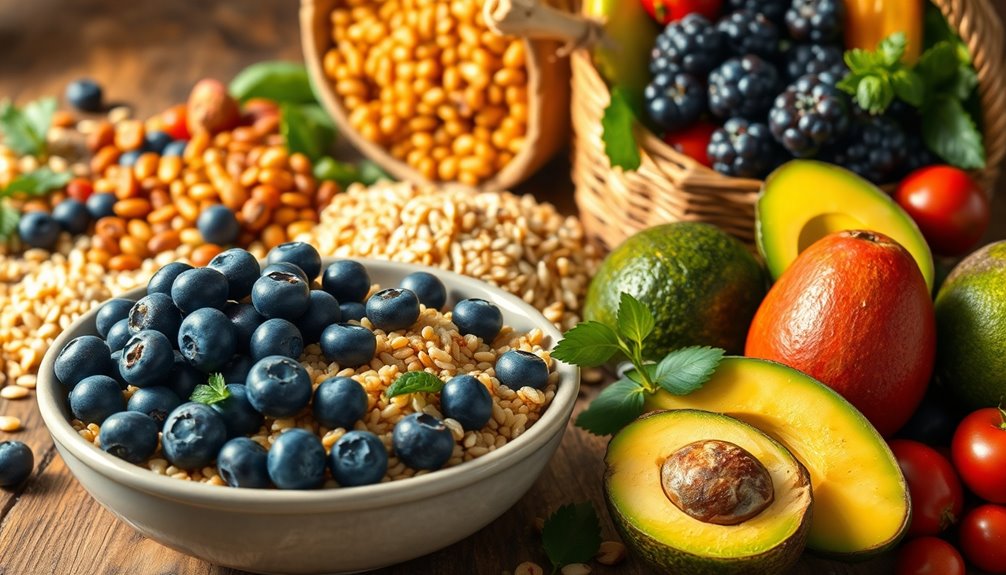
Incorporating fiber-rich options into your diet is essential for promoting digestive health and preventing constipation, especially as you age. Fiber plays a crucial role in maintaining regular bowel movements and can help you feel fuller for longer, which is beneficial for weight management.
Start by adding whole grains to your meals. Opt for brown rice, whole-wheat bread, and oatmeal instead of their refined counterparts. These choices won't only boost your fiber intake but also provide essential nutrients.
Fruits and vegetables are also great sources of fiber. Aim to fill half your plate with colorful produce, like berries, apples, carrots, and leafy greens. These options aren't only high in fiber but also packed with vitamins and minerals.
Legumes, such as beans and lentils, are another excellent addition. They're versatile and can be added to soups, salads, or even made into veggie burgers. Nuts and seeds can also provide a fiber boost, perfect for snacking or as toppings on yogurt or salads. Additionally, incorporating raised garden beds can help you grow your own fiber-rich fruits and vegetables at home.
Limit Processed Sugars
While focusing on fiber-rich foods is important, it's equally vital to limit your intake of processed sugars. These sugars, often found in snacks, sodas, and desserts, can lead to various health issues like weight gain, increased blood sugar levels, and a higher risk of heart disease.
As you age, your body's ability to process sugars diminishes, making it crucial to be mindful of what you consume.
Start by reading labels carefully. You'll often be surprised by how many foods contain added sugars, even those that seem healthy, like yogurt or granola bars.
Opt for whole, unprocessed foods whenever possible. Fresh fruits can satisfy your sweet tooth without the added sugars and unhealthy ingredients.
When cooking or baking, consider using natural sweeteners like honey or maple syrup, but remember to use them sparingly.
You can also experiment with spices like cinnamon or vanilla to enhance flavor without relying on sugar.
Monitor Portion Sizes

As you navigate your dietary choices, monitoring portion sizes becomes essential for maintaining a healthy lifestyle. As we age, our metabolism slows down, and our bodies require fewer calories. This makes it crucial to pay attention to how much you're eating.
Start by using smaller plates and bowls to help control portions. When you fill a smaller dish, it can make a regular serving look more substantial.
Also, try measuring out servings using cups or a kitchen scale until you get a sense of appropriate portion sizes. This practice can prevent overeating and help you enjoy your meals more mindfully.
Additionally, listen to your body's hunger cues. If you're not feeling hungry, don't force yourself to finish everything on your plate. It's okay to save leftovers for later.
Eating slowly and savoring each bite can also help you recognize when you're satisfied, reducing the likelihood of overeating.
Choose Healthy Fats
Choosing healthy fats is vital for supporting your overall health as you age. These fats play a crucial role in brain function, heart health, and reducing inflammation. Instead of reaching for saturated fats found in fried foods or fatty cuts of meat, opt for healthier alternatives.
Incorporate monounsaturated and polyunsaturated fats into your diet. Foods like avocados, nuts, seeds, and olive oil are excellent sources. They not only provide essential fatty acids but also help lower bad cholesterol levels.
Fatty fish, such as salmon and mackerel, are rich in omega-3 fatty acids, which can boost heart health and support cognitive function.
It's also wise to limit trans fats, often found in processed snacks and baked goods. These can raise bad cholesterol and lower good cholesterol, increasing your risk of heart disease.
When cooking, consider using heart-healthy oils instead of butter or lard. Experiment with different oils in your salads or sautéing vegetables to discover flavors you enjoy.
Plan Balanced Meals
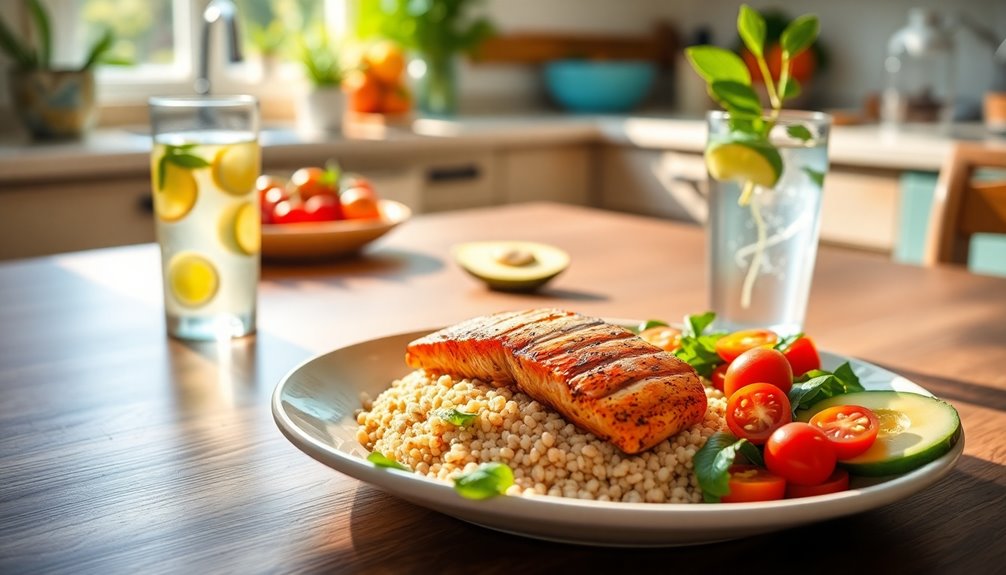
Planning balanced meals is essential for maintaining your health as you age. A well-rounded diet provides the nutrients your body needs to function optimally. Start by incorporating a variety of food groups into each meal. Aim for half your plate to be filled with fruits and vegetables, which are packed with vitamins, minerals, and fiber.
Next, include whole grains, such as brown rice or whole wheat bread, to provide energy and support digestive health. Don't forget about proteins; lean meats, fish, beans, and legumes are great options that help maintain muscle mass.
Additionally, pay attention to portion sizes to prevent overeating. Using smaller plates can help you control portions without feeling deprived. Try to limit processed foods high in sugar, salt, and unhealthy fats, as they can impact your overall health.
Lastly, stay hydrated! Make water your drink of choice and aim for at least eight glasses a day.
Frequently Asked Questions
How Can I Make Healthy Eating More Enjoyable for Seniors?
To make healthy eating more enjoyable for seniors, you can introduce colorful dishes, involve them in meal prep, explore new recipes, and encourage social meals. Variety and interaction can turn healthy eating into a delightful experience.
What Are Some Easy Recipes for Seniors With Dietary Restrictions?
Sure, because who doesn't love a good quinoa salad? For seniors with dietary restrictions, try simple recipes like vegetable stir-fries or baked fish. They're healthy, easy to make, and won't scare anyone away from the kitchen!
Are There Specific Vitamins Seniors Should Consider Taking?
Yes, you should consider vitamins D, B12, and calcium. They support bone health, energy levels, and overall wellness. Always consult your doctor before starting any new supplements to ensure they're right for you.
How Can I Help a Senior With Poor Appetite?
When a senior's appetite wanes, you can whip up warm, welcoming meals. Try tempting treats like tasty soups or smoothies. Small, satisfying snacks throughout the day can also spark their interest in eating again.
What Are Signs of Malnutrition in Older Adults?
You should look for signs like weight loss, fatigue, weakness, and changes in mood or behavior. If you notice these symptoms, it's crucial to consult a healthcare professional to address potential malnutrition in older adults.
Conclusion
Incorporating these dietary tips is like planting seeds for a vibrant garden of health in your golden years. By prioritizing nutrient-dense foods, staying hydrated, and embracing fiber, you're nurturing your body and mind. Limiting processed sugars and choosing healthy fats are the sunshine and rain that help your well-being flourish. Remember, every balanced meal is a brushstroke on the canvas of your health. So, embrace these habits, and watch your vitality bloom!

